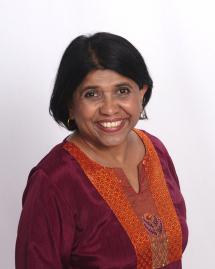
Dr. Urmila Diwekar is currently President of the Stochastic Research Technologies LLC, and the Vishwamitra Research Institute (VRI, www.vri-custom.org), a non-profit research organization that she founded in 2004 to pursue multidisciplinary research in the areas of Optimization under Uncertainty and Computer-aided Design applied to Energy, Environment, and Sustainability.
From 2002-2004, she was a Professor in the Departments of Chemical Engineering, Bio-Engineering, and Industrial Engineering, and in the Institute for Environmental Science and Policy, at the University of Illinois at Chicago (UIC). From 1991-2002 she was on the faculty of the Carnegie Mellon University, with early promotions to both the Associate and the Full Professor level.
In chemical engineering, she has worked extensively in the areas of simulation, design, optimization, control, stochastic modeling, and synthesis of chemical processes. She has made major contributions to research on batch distillation, and this work is well recognized. She is the author of more than 165 peer-reviewed research papers, 7 books, and 15 chapters, and has given over 350 presentations and seminars, and has chaired numerous sessions in national and international meetings. In separations, she is well-known for her pioneering work in batch distillation design, simulation, optimization, and optimal control.
She has published more than 31 peer-reviewed journal papers, 65 presentations (15 plenary/keynote presentations), and conducted 11 educational workshops on this topic. She has also published the first book on this topic. This is an authoritative, first of its kind book which is widely used all over the world. This book received excellent reviews and the second edition of this book was published in early 2012. She is the author of a comprehensive software package for batch distillation simulation, optimal design, and control called MultiBatchDS which is used in pharma and specialty chemical companies in USA, Europe, and Asia.
She has also extended the new approach for optimal control she developed from batch distillation to batch crystallization. In last two decades, she has worked on green separation processes including new approaches to computer-aided design, solvent selection and solvent recycling, NOx removal process, controlling naturally occurring radioactive materials from fracking, and arsenic removal from water This year she is the recipient of Claraence Gerhold award (again a national award) which recognizes an individual’s outstanding contributions in research, development, or in application of separations technology for her pioneering work on batch distillation and green separations.
Apart from Clarence Gerhold award, in 2009, she was elected a Fellow of American Institute of Chemical Engineers (AIChE). In the same year, in recognition of her work on batch distillation research for pharmaceutical industries, her work on ecological sustainability, and biomedical engineering she was also elected a Fellow of the American Institute of Medical and Biological Engineering (AIMBE). In October 2011, she received the coveted Cecil Award for Environmental Chemical Engineering from the Environmental Division of AIChE. She is the first woman to receive this national award in its 39-year history. In November 2011, she received the Thiele award for outstanding contributions to chemical engineering, awarded by the Chicago chapter of AIChE.
In 2015 she received one of the most prestigious awards of AIChE (an Institute award), the Energy and Sustainability award for leadership in research related to conventional energy, renewable energy, energy-water nexus, carbon capture and environmental control for energy, pollution prevention, and sustainability. Last year she was invited as a plenary speaker at the international workshop on global sustainability by National Academy of Sciences, Hungary for the Pontific academy of sciences in Rome.
